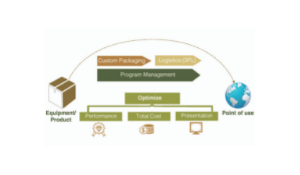Why your packaging supplier should be a partner in your supply chain
26 December 2018

Custom industrial packaging is a service industry, because the packaging is customized to meet a specific application (a set of needs to ship a product to its point of use, and has unique requirements beyond the actual packaging material.) In fact, packaging is only part of “your problem”: getting your product to it’s point of use, which will require logistics, management, coordination, and other services. Most companies outsource their packaging, either to a supplier or a distributor, because it is not considered a strategic part of a company’s value proposition. It is, however, an operational imperative. Ideally, packaging should be part of the new product introduction (NPI) planning process for a company’s supply chain, with a goal of reducing complexity, and waste as well as streamlining communications.
Ultimately, packaging, along with logistics and some program management (as illustrated in the diagram), is vital to help companies move their products to its point of use. Packaging is an essential, but not complete, solution to the problem. Along with protection during transit, a product’s packaging also reflects on the brand, and quality of the product. While packaging material is a commodity, a packaging solution also includes services such as:
- Design
- Manufacturing
- Testing
- Fulfillment
- Customer service
These services represent the major activities (or benefits) that a company must consider when engaging a packaging supplier. And every company that purchases packaging will need differing levels of performance in these activities to support their businesses. For example, an electronics company with a product that is built to order, may be most interested in the speed at which a foam set order can be fulfilled, as well as the cost of producing small batches of the packaging (say less than 500 pieces). A robotics company may need sophisticated design and materials selection to protect very fragile protrusions of their product, and may be less concerned with the cost of the packaging than getting their product to its final destination without damage due to shock, vibration, or abrasion. When choosing a packaging vendor, you should assess your needs for those activities vis-a-vis the capabilities of the packaging supplier.
The most important activity of a packaging supplier is customer service. Great customer service can reduce the amount of time and mental clutter that you have to spend coordinating and communicating with your supplier during each order. When mistakes are made, no matter whose fault it is, the supplier must be prepared to solve the problems as quickly as possible to avoid disruption to your business. Often a single representative will be the point person for the packaging supplier (an account manager); make sure they are empowered to solve your problems, and find out who else will take care of you if they are not around? Here are some typical requests that a packaging supplier will help you with:
- Our firm has a rush order, we will need 250 pieces by next Monday.
- Can we move delivery of our order to before 2PM?
- We need 2 units for a hot order by tomorrow.
- I need to make a change to the packaging design due to a new model
- I need special markings on the packaging for this order only.
Your packaging supplier should be able to handle your exceptions and be flexible with your needs. If your needs will include: on-site support, many exceptions, and a lot of custom packaging in small batches or short lead-times, then you will need to a local packaging supplier. Tour their facility and understand a little about their processes, so that you can understand how your exceptions will be handled in their system, and what their limitation will be. A good relationship with your packaging supplier will make them a trusted partner in your supply chain and even an extension of your team.
